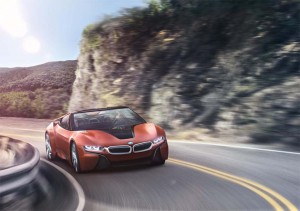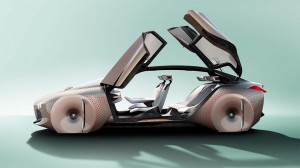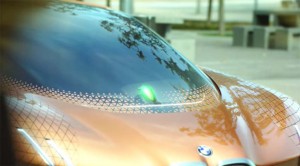BMW is the latest automaker to confirm plans to go to market with an autonomous vehicle, the Bavarian maker teaming up with tech partners Intel and Mobileye to “bring fully automated driving technology to the street” by 2021, the maker’s CEO announced Friday.
The announcement follows the debut of several futuristic concept vehicles meant to mark BMW’s 100th anniversary. But it also comes a day after U.S. safety regulators launched an investigation into a fatal crash of a Tesla Model S sedan that was operating in its semi-autonomous Autopilot mode. That has raised new concerns about the technology despite hopes that self-driving vehicles will help improve safety and reduce worsening traffic congestion.
“The combined expertise of Intel, Mobileye and the BMW Group will deliver the next core building block to bring fully automated driving technology to the street,” BMW chairman Harald Krüger said in a statement.
The move might come as a surprise to those who think of BMW in terms of its long-running tag-line, “The ultimate driving machine,” but the maker has been exploring self-driving technology for nearly two decades, and, according to Kruger, it will give BMW customers new options – the ability to ride hands-free or switch to manual driving mode.
(For the breaking story on the Tesla Autopilot investigation, Click Here.)
“With this technological leap forward, we are offering our customers a whole new level of sheer driving pleasure whilst pioneering new concepts for premium mobility,” Kruger said.
Exactly what the planned autonomous vehicle will look like, BMW isn’t saying, though it offered a look at one possible concept, dubbed the BMW i Vision Future Interaction – which suggests it will likely use a battery-based drivetrain and could be sold through the maker’s new zero-emission sub-brand, BMW i.
During a live conference on the Future of Mobility, in Munich, BMW lead interior designer Oliver Heilmer suggested that by going electric, the maker could radically alter the layout of the cabin. By placing the drivetrain under the floor, for example, it would eliminate the need for an engine compartment and, “in the future, we could use this space in a different way.”
In its statement, BMW also noted that the platform it will use will be capable of being used for various levels of semi- and fully autonomous technologies. This would begin with what’s called Level 3, or “eyes-off,” driver assistance, to Level 4, which means fully hands-free driving but a motorist ready to take over if necessary. The longer-term goal would be to reach Level 5, with vehicles that wouldn’t need anyone behind the wheel, at all.
But the maker said the key to its announcement was the focus on bringing a fully autonomous vehicle to market by 2021, rather than just the semi-autonomous models that are beginning to appear on the road. That includes the latest-generation BMW 7-Series, as well as the upcoming Mercedes-Benz E-Class which can pass a slower vehicle on a limited-access highway without the driver’s intervention.
(New study says three of four American motorists want autonomous vehicles. Click Here for more.)
To make its vision a reality, BMW is turning to two tech partners, Intel, the world’s largest computer chip manufacturer, and Mobileye. The latter firm, an Israeli start-up, is already providing the tiny camera systems used in the latest Advanced Driver Assistance Systems, or ADAS. But it is also partnering with a handful of makers – also including General Motors and Nissan – to develop next-generation 3D roadmaps and other technologies needed for autonomous vehicles.
The BMW announcement immediately generated buzz around the world, driving up the stock price of its partners, as well.
But there was also a different sort of buzz triggered by Thursday’s announcement by the National Highway Traffic Safety Administration that it had launched an investigation into a fatal crash of a Tesla Model S in Florida on May 7. The driver had been operating the vehicle in Tesla’s semi-autonomous Autopilot mode at the time of the crash.
Many experts believe that self-driving vehicles will ultimately result in significant improvements in traffic safety, while also reducing traffic congestion. NHTSA – like similar agencies abroad – has announced its support for the technology and is currently developing regulatory guidelines covering the testing and implementation of autonomous vehicles.
But at a number of public hearings, critics have asked the agency to slow down and consider the potential problems. The Tesla crash could increase that skepticism. But as the BMW announcement suggests, it is not likely to slow down industry enthusiasm and the race to bring the first fully autonomous vehicles to market.
(Automakers enter “gray zone” as they roll out semi-autonomous technologies. For more, Click Here.)



